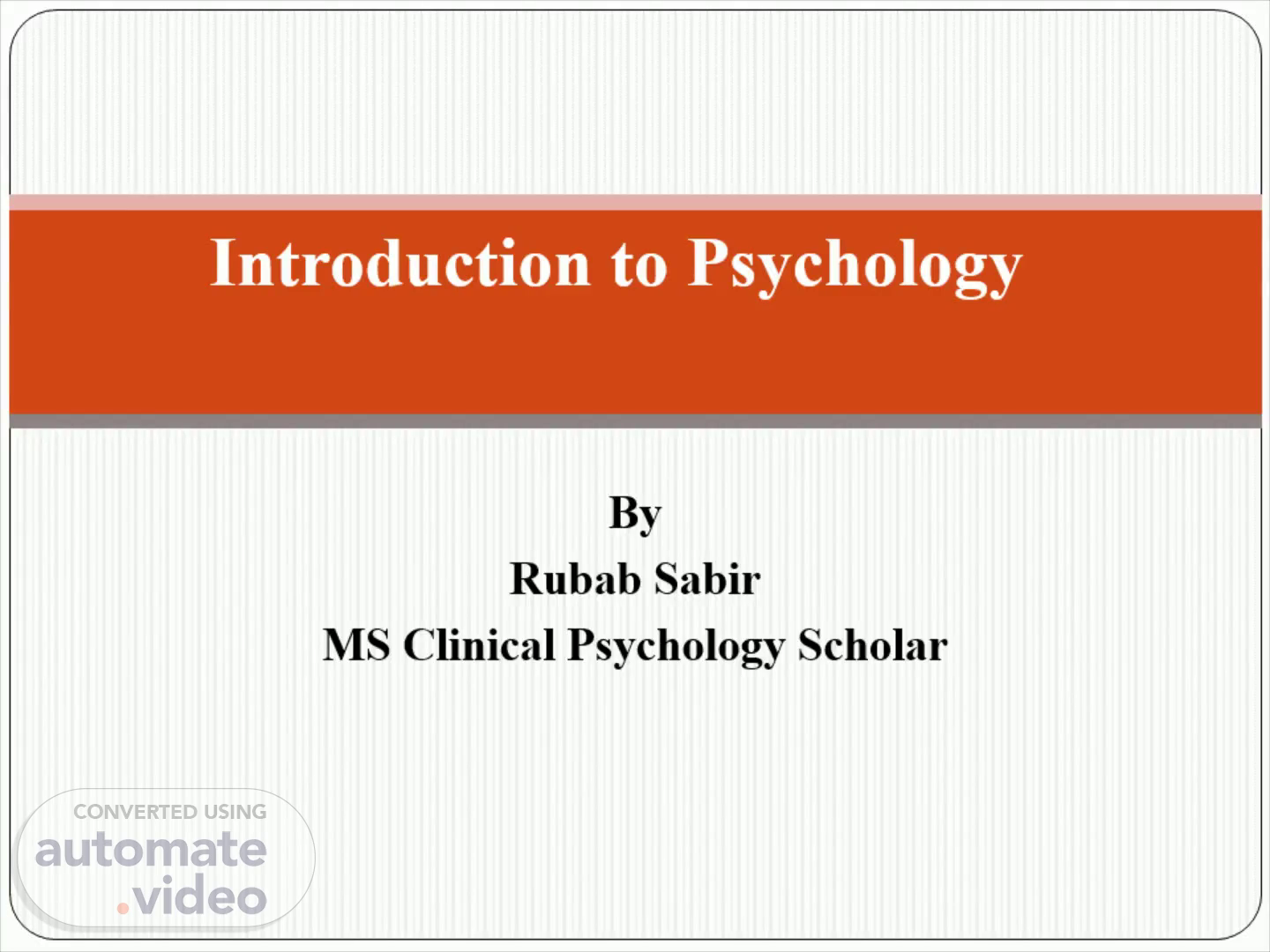
Introduction to Psychology
Scene 1 (0s)
By Rubab Sabir MS Clinical Psychology Scholar. Introduction to Psychology.
Scene 2 (7s)
What Is Psychology?. Beginning with the first psychological laboratory, founded in 1879 by German philosopher and physiologist Wilhelm Wundt, modern psychology’s can be traced in many disciplines and countries. Psychology’s historical perspectives and current activities lead us to define the field as the science of behavior and mental processes..
Scene 3 (23s)
Definition. “Psychology is the scientific study of behavior and mental processes …. Human or Animal” Psychologists study animals’ behavior too; to better understand and predict human behavior, the study of animal behavior becomes essential at times, especially because some researches cannot be carried out with humans due to safety reasons or ethical issues.
Scene 4 (40s)
Difference between Behavior and Mental Process. Behavior is; overt Manifest Obvious E asy to study..
Scene 5 (52s)
Goals of Psychology. The main goals of psychology are: a) Observation b) Description c) Understanding d) Explanation e) Prediction f) Control of human behavior and mental processes..
Scene 6 (1m 2s)
Goals of Psychology. Main and important goals of psychology are; • To understand the nature and mechanisms of behavior and mental processes • To develop an understanding of the relationship between behavior and mental processes • To apply this understanding to real life situations and, on the basis of this understanding, predict for the future • To employ the scientific approach for developing this understanding.
Scene 7 (1m 20s)
Psychology is a science. Scientific method is a systematic and organized series of steps that scientists adopt for exploring any phenomenon in order to obtain accurate and consistent results. These steps involve observation, description, control, and replication Psychology employs the scientific method for gathering knowledge and information. Psychology uses scientific procedure that is essential to be adopted in order to carry out psychological research; otherwise the research will not be considered authentic, reliable, or scientifically valuable..
Scene 8 (1m 42s)
Scope of Psychology. After doing a degree course in psychology one may join a variety of work settings, the most common being: • Education/teaching • Research • Hospitals/clinics • Recruiting/screening agencies • Specialized professional settings e.g. armed forces, social welfare etc..
Scene 9 (1m 57s)
Popular areas of psychology. Clinical Psychology : A branch of psychology concerned with the study, diagnosis, and treatment of abnormal behavior. Clinical psychologists are trained to diagnose and treat problems ranging from the every day crises of life such as grief due to the death of a loved one, to more extreme conditions, such as a loss of touch with reality..
Scene 10 (2m 15s)
Industrial / Organizational Psychology : A branch of psychology that studies the psychology in action at the workplace, including productivity, job satisfaction, and decision-making. Health Psychology: The branch of psychology that explores the relationship of psychological factors and physical ailments or disease e.g. Health psychologists are interested in how the long- term stress (a psychological factor) can affect physical health..
Scene 11 (2m 34s)
Environmental Psychology : A branch of psychology, that focuses upon the relationship between people and their physical environment. Sport Psychology : The branch of psychology, that studies the psychological variables that have an impact upon the sportspersons’ performance; e.g. how stress can affect sport performance, how morale can be boosted etc. Forensic Psychology: The branch of psychology that investigates legal issues and psychological variables involved in criminal behavior ; e.g. what factors determine criminal tendencies, how criminals be reformed.
Scene 12 (2m 58s)
Misconceptions about psychology and psychologists.
Scene 13 (3m 34s)
Psychologists can predict fate or destiny. This is not actually the case. Lay people have these views because they see that psychologists are capable of accurately telling what type of people others are, what they are capable of doing, what are their potentials and capacities etc. In reality, the case is different since psychologists can only predict not the destiny but the direction that one may adopt in future; psychologists can assess and predict personality and behavior because they get professional training for studying human behavior and that is why they can easily tell what type of a person one is, what might be his potentials, and how much he/ she is capable of performing certain tasks..
Scene 14 (4m 5s)
Psychologists are doctors. Another very common misconception is that psychologists are doctors. Psychologists are not at all doctors; they are specially trained people who deal with the psychological problems and not the medical problems. Psychiatrists, on the other hand, are doctors who have a professional degree in medicine as well as training in treating those suffering from psychiatric/ psychological problems..
Scene 15 (4m 23s)
Psychologists give medicines. Not psychologist, but psychiatrists are the ones who prescribe medicine to the mentally ill patients, as they have a professional degree in medicine that authorizes them to prescribe medication..